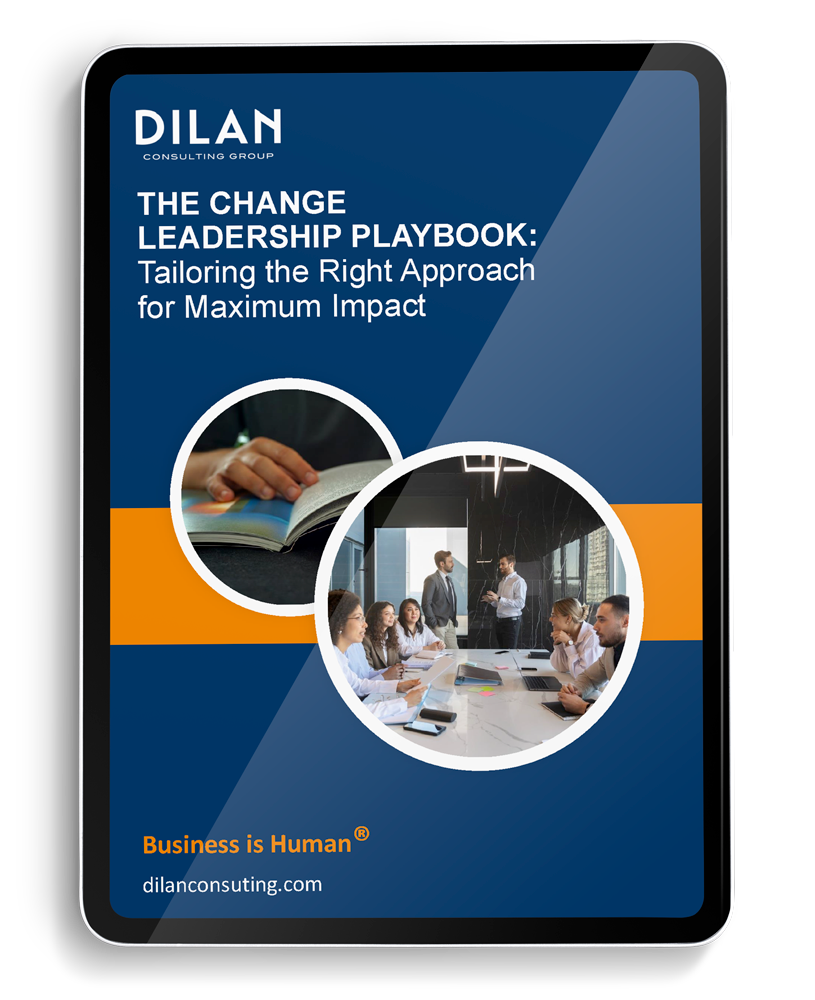Leaders don’t just manage tasks; they set the emotional tone of an organization. When tensions rise, priorities collide, or feedback lands badly, emotional intelligence (EI) is what keeps performance, relationships, and resilience intact. The question for HR and executive sponsors isn’t whether to develop EI, it’s how to do it well, and who is best qualified to help.
At DILAN Consulting Group, our consultants and coaches are not simply therapists who added coaching to their toolkit. They are licensed psychologists with doctoral training and organizational leadership experience. This dual expertise allows them to navigate the human complexities of leadership while also understanding the realities of needing to deliver strategy and execution.
1) What Emotional Intelligence Really Is (and Why That Matters)
Long before EI became a corporate buzzword, psychologists Peter Salovey and John D. Mayer offered a precise definition: EI is “a form of social intelligence that involves the ability to monitor one’s own and others’ feelings and emotions, to discriminate among them, and to use this information to guide one’s thinking and actions.” (Salovey & Mayer, 1990, p. 189).
This definition frames EI as a set of abilities, accurate perception, understanding, and regulation of emotion, rather than a vague collection of traits. Treating EI as an ability encourages interventions that focus on assessment, deliberate practice, and feedback, rather than just motivational pep talks. Psychologist-coaches are trained to assess and build abilities like these systematically. Evidence shows that coaching can deliver real results. A widely cited meta-analysis found coaching produced, “key positive effects for learning and performance outcomes.” (Jones, Woods, & Guillaume, 2016, p. 257).
2) What Makes EI Development Stick: Spaced, Structured Learning
If the goal is to genuinely raise EI, not just motivation, structure matters. In a study comparing formats of coaching-skills training, Anthony M. Grant (2007) found that a 13-week spaced learning format improved both coaching skills and EI, while a two-day intensive did not. The takeaway for HR: sustained, structured coaching outperforms “quick fix” workshops.
The practical takeaway for HR: spaced learning with real-world practice outperforms “hit-and-run” workshops for EI growth. That finding aligns with broader evidence that coaching, when executed well, delivers positive learning and performance results in organizations (Jones et al., 2016).
This is where DILAN’s psychologist-coaches excel. They design spaced learning interventions that build skills over time, blending practice, reflection, and feedback in ways proven to work.
3) What Psychologists with Leadership Experience Bring
- Years of rigorous preparation
Becoming a licensed psychologist involves over a decade of education, supervised practice, and licensure exams. This foundation equips our coaches to use validated assessments, recognize behavioral dynamics, and intervene ethically when deeper issues arise. - Organizational credibility
DILAN’s psychologists are not only trained in assessment and intervention. They have also held leadership roles themselves. They understand the pressures of leading teams, driving change, and balancing performance with culture. This lived leadership experience makes their coaching highly practical and credible with executives. - Contrast with standard coaching credentials
Many coaching programs can be completed in months to a few years. While valuable, they do not provide the depth of training in human behavior, assessment, or organization systems that psychologist-leaders bring. Even the International Coaching Federation’s (ICF) own definition underscores the distinction: coaching is “partnering with clients in a thought-provoking and creative process that inspires them to maximize their personal and professional potential.” That definition distinguishes coaching from psychology, indicating that most coaches are not trained to address complex psychological and organizational dynamics.
4) A Real-World Leadership Scenario: How Approaches Differ
The situation: A VP of Operations derails a product launch after a tense cross-functional meeting. Several directors report that the VP shuts down dissent and retaliates after feedback.
How a DILAN Psychologist-Coach Works
- Assessment first. Use validated 360s and ability-based EI measures to identify blind spots and triggers.
- Formulation. Develop a hypothesis about the interaction between stress, cognitive appraisals, and emotion regulation strategies fueling defensiveness.
- Deliberate practice. Create spaced micro-interventions, such as emotion labeling, cognitive reappraisal, and structured “pause-then-probe” routines, reinforced through role-play and feedback.
- Boundary management. If mood symptoms, trauma triggers, or substance use emerge, the psychologist is trained and ethically bound to manage risk and refer as needed.
How a Non-psychologist Coach May Proceed
- Set behavioral goals.
- Introduce communication techniques.
- Use stakeholder feedback loops.
Both approaches add value, but the psychologist-coach offers depth, diagnostic acumen, practical credibility and safeguards that general coaching simply cannot.
5) Why This Matters for Organizations
The research is clear; coaching can improve leadership. But when the stakes involve complex, emotion-driven behavior, the DILAN difference is that our coaches are psychologist-leaders, equipped with both psychological science and organizational experience.
For HR leaders and executives, the implications are straightforward:
- Choose psychologist-coaches when leaders must address deep-seated behavioral patterns.
- Invest in spaced learning, not quick fixes, for durable change.
- Partner with coaches who can bridge science and leadership practice.
Call to Action
If your leaders need more than strategies and checklists—if they need to change how they perceive, interpret, and respond under pressure—partner with a firm whose coaches are licensed psychologists and proven leaders. At DILAN Consulting Group, we combine evidence-based assessment, psychologically informed practice, and real-world leadership experience to build durable EI—because Business is Human®.
References
California Board of Psychology. (n.d.). Frequently asked questions: Supervised professional experience.
Grant, A. M. (2007). Enhancing coaching skills and emotional intelligence through training. Industrial and Commercial Training, 39(5), 257–266.
International Coaching Federation. (n.d.-a). About ICF.
International Coaching Federation. (n.d.-b). Credentialing: Experience & education requirements (ACC, PCC, MCC).
Jones, R. J., Woods, S. A., & Guillaume, Y. R. F. (2016). The effectiveness of workplace coaching: A meta-analysis of learning and performance outcomes from coaching. Journal of Occupational and Organizational Psychology, 89(2), 249–277.
Salovey, P., & Mayer, J. D. (1990). Emotional intelligence. Imagination, Cognition and Personality, 9(3), 185–211.
Texas Behavioral Health Executive Council. (n.d.). How to become a licensed psychologist.



